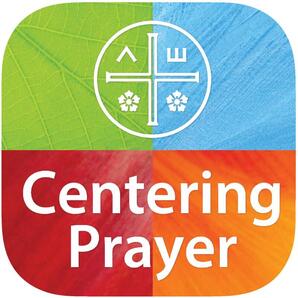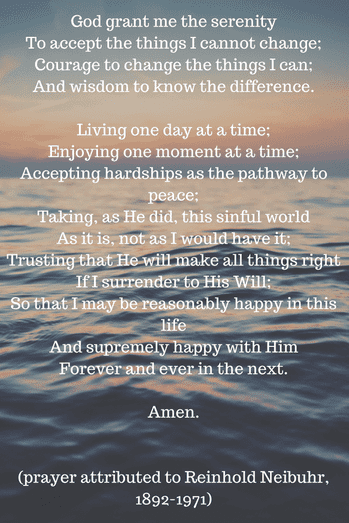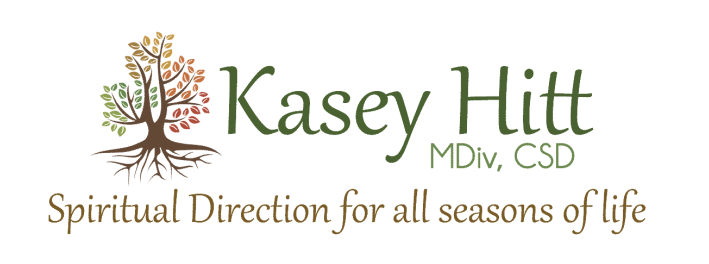 Photo by Nathan Dumlao on Unsplash Two people in my life are facing a terminal illness. And here’s what else they have in common: gratitude. Every time I talk to them, whether a simple conversation or in spiritual direction, I am amazed at the depth of their gratefulness. Their faces light up. It is like their diagnoses gave them new eyes to see life. And they are overwhelmed by the beauty right in front of them. Even more so, they are overwhelmed by the peace of God inside of them. The windows of their souls reflect it in such delightful ways. “Every day I wake up so happy!” one exclaimed to me (without a single relationship or situation changing in their life). How is this possible? Much of it is pure gift. Grace. And some of it, I am sure, is because both have done inner work in the years leading up to this moment. They learned how to listen deeply to God and how to listen deeply to others. They entered into meditation and mindfulness. They learned to play and be playful. They sought out spiritual direction and a precious few others to accompany them along their inner journey. Now their outer journey reflects what they cultivated within. Awe. Humor. Peace. Kindness. Joy. (Just to name a few) I am honored to be a witness. They are teaching me a lot. One of their gifts is reflected in the Sufi poet, Rumi's words, “I saw grief drinking a cup of sorrow and said to it, ‘Tastes sweet does it not?’ Grief confessed, ‘You’ve caught me and ruined my business. How can I sell sorrow when you know it’s a blessing?’” If you have no idea how sorrow can be a blessing and if you do not wake up happy, maybe it is time for an inner journey of your own. There is so much to be grateful for in this life.  Photo by Damian Siodłak on Unsplash Photo by Damian Siodłak on Unsplash Choices can be difficult. Wanting to make the perfect one, I can struggle with “buyer’s remorse.” It can be about a purchase or any decision I have made or need to make (especially if others are concerned). Did I take enough time to make the best choice? What if I didn’t? Was I right? Was I wrong? I will replay the options. Especially if my choice does not please others, I will replay it even more. Sometimes it can become compulsive, stuck on a loop in my brain. We all have experienced the stress that comes from obsessive over-thinking. Over the years, I have tried a variety of ways to “throw a stick in the spokes” and stop the constant thought-cycle. The practice of Centering Prayer has been one thing that, gradually, has made a difference. Centering Prayer can be a challenge as one gets to discover all the places the unruly mind wants to wander instead of stay in the present (it is certainly not interested if the present has feelings it doesn’t want to feel!). As I have grown in acceptance of the brain’s (sometimes bizarre) escapades to do anything but feel reality and rest in God, I have grown in awareness of when I am joining its invitations to run away to the circus of compulsivity. Here are two simple ways of returning home:
The keys to both are patience and gentleness (two indicators or “fruits” of the Holy Spirit as described in Galatians 5:22-23). It may take a while, but with gentle persistence old compulsive paths will be less and less traveled. And relief will rise with your every return to the pathways of peace.  Spiritual practices, like meditation and even church-going, can become spiritual bypass—ways of bypassing reality both outside and inside of us, dissociating from wounds within and without, ignoring the healing work that needs to be done in our inner and outer world. But spiritual practices can also be vehicles for transformation of both ourselves and our world. How?—by giving us new ways of seeing and being (which is the whole point of authentic spiritual practice). Let’s take a look at a few practices... Conscious Breathing: With as little as 10 slow, complete exhales and 10 full, relaxed inhales, we can calm the fight, flight, freeze survival impulse, allowing us to move from a reactive, closed off, defensive place to a receptive, open, deeper place. Centering Prayer: Through daily practice of 20 minutes of silent surrendering to God’s presence & action, we let go of our ego-drivenness and receive inner healing of compulsions and soul wounds. Not only does this bring personal freedom but it releases us from projecting our compulsions and wounds on others and passing them down to our children. Lectio Divina: Spiritual reading allows a word or phrase in a small portion of inspired text, whether sacred Scriptures like the Psalms or a poem, to speak to us. Rather than bringing what we already know or studying it, we allow the text to study us! As we bring our story, our lives, to it, we humbly listen for the wisdom and guidance being offered (which may be encouragement to see a counselor or write a letter to your senator!). Awareness Examen: Looking over our lives at the end of the day through the eyes of God helps us become aware of God’s life-giving presence and action (and the times throughout the day when we were unaware or resistant). The patterns of what is life-giving and life-draining help us discern who we are and what we are to offer this world. Silent Retreats: Extended time in silence and solitude creates space for our souls to rest and play which opens us to better hear the “still, small voice” which may be drowned out by the external noise of daily life or the internal noise of comparing ourselves to others. There are so many practices I could list here but the point isn’t the practice itself, it’s the “fruit.” Seated meditation may not fit you. You may desire some kind of moving meditation, like dance or qigong. Or you may prefer to spend time in nature or doing art. What practices have you found that cultivate love in you? What helps you have eyes to see and tend to the suffering both inside yourself and in others? Which ways of wisdom help you discern what is yours to offer this world (not out of compulsion but compassion)? A Spiritual Director can companion you on this journey of discovery of spiritual practices. But remember, it’s not necessarily the practices, it’s the humans who are transformed by these practices, that this world needs. What do spiritual practices like Centering Prayer offer a hurting world?—YOU!  https://www.contemplativeoutreach.org/ centering-prayer-method/ https://www.contemplativeoutreach.org/ centering-prayer-method/ While they may share silence and look the same on the outside, join me in taking a look on the inside… Different forms of meditation offer the practitioner different gifts depending on their focus. Some of these forms and gifts are mindfulness, movement, awareness, breathing, insight, chakra-opening, loving-kindness, relaxation, guided, calming, and creativity. As one who meditates, I appreciate and practice a variety of methods and even combine some, but I call Centering Prayer my main practice. However, many do not understand how Centering Prayer offers anything different from other forms of meditation. Centering Prayer was developed by Trappist monks, Fathers William Meninger, Basil Pennington and Thomas Keating, to help bring the ancient practice of contemplative prayer within the Christian tradition to people outside the monastery—which is most of us! Inspired by early Christian contemplatives and the medieval text, The Cloud of Unknowing, their process—20 minutes of silence once or twice a day—allows the power of and presence in Silence to be accessed by those of us who live in the “world of words.” This prayer’s nickname, the "Prayer of Consent," reveals how it differs from other forms of meditation. Rather than focusing solely on being present to sounds and sensations or giving the ego mind something to do like count, follow our breath, or say a mantra, Centering Prayer’s sole focus is surrendering. We consent to the presence and action of God within us. During the 20 minutes of sitting comfortably, but alert, with head up and eyes closed (or with a resting gaze toward the floor), we introduce a “sacred word” as a symbol of our intention to consent. This can be a word like “Peace,” “Jesus,” or “Love.” Whenever we become aware of our mind being engaged with thoughts (no matter how interesting or enlightening!), we simply and gently say our sacred word. We come back to surrendering all—every plan, worry, person, to-do list, dream, ah-ha, observation, insight…you get the idea. We let go of everyone and everything, trusting God with and for all. Given the focus is learning to trust God, it does not matter how many times we catch ourselves wandering and returning. Every instance is an opportunity to “come home” and trust the Beloved with each. Some days we will find ourselves saying our sacred word quite often, for we may have more weighing on our hearts, minds, and bodies than other days. Notice how relational Centering Prayer is! It can certainly expose an unhealthy image of God which may be why a part of us rightly refuses to surrender! To explore that being a possibility rather than the normal ego tantrum of giving up control, go here. How we enter into Centering Prayer can help us consent. We see a model for this powerful and humble consent in Jesus, especially in the Garden of Gethsemane after asking to be spared from suffering but willing to surrender anyway. His deep trust in the Heart of God leads him to say what he taught his disciples to pray, “Thy will be done.” Jesus’ response echoes the words of his mother, Mary, after being told she would bear the Messiah. To this overwhelming and possibly dangerous news, she says to the angel bringing her the announcement, “Let it be done unto me according to Your Word.” Perhaps Jesus learned his prayer of surrender from her! Every time we enter into Centering Prayer, we join Mary and Jesus in this powerful, humble, and holy consent. For twenty minutes, we practice releasing our grasp on our plans, desires, abilities, and attachments. After coming to an end of our own words in prayerful petition, no matter how a situation may look to us (and others) on the outside, we trust in the presence and work of the One who dwells in secret on the inside. Try this:
*Contemplative Outreach offers an app with a timer and ways to enter into and end your time of Centering Prayer. And no matter what level of experience you have, you are always welcome to join me for communal Centering Prayer every Friday morning from 9:00 AM- 10:00 AM (Central Time Zone). Contact me for the Zoom link.  My Russian Blue cat, Birdie, on my lap during Centering Prayer My Russian Blue cat, Birdie, on my lap during Centering Prayer Cats should be the mascot of contemplation. They have resting awareness down. Some people think contemplation is laziness, but this is far from the truth. “Doing nothing so God can do everything” is hard work! It takes an active, yet relaxed, vigilance to stay present rather than follow the mind into the past or future where regret and worry reign. But like a good Zen master, the cat can teach us. "Every single creature is full of God and is a book about God. Every creature is a word of God," Meister Eckhart proclaimed in the late 13th century. I find this to be true as I spend time with my cat. Listening and watching with the ears and eyes of my soul, I discover she has a lot to teach me. Here's some advice she offers... 5 feline tips for contemplation (also known as "contemplative catnaps"):
Cats make contemplation look simple. While simple, it can be challenging. Surrender and serenity are daily exercises that may look different each day! A routine-loving cat still changes nap spots, so how do surrender and serenity look for you today? Watch a cat for a while and allow the Spirit of God, which enlivens both you and the cat, to speak to you through this furry part of Creation. Advent is a time of gestation. Much like the discomfort and anticipation of pregnancy, we wait on the arrival of what is deeply hoped for and anticipated.
A few weeks ago I was in a sensory-deprivation tank floating on 1500 pounds of salt. It's supposed to be (and usually is) relaxing but that day I kept squirming around...like a baby in the womb. Last year I went to a Benedictine Sister for both Spiritual Direction and healing touch at a monastery where I would be facilitating a retreat the following day. During the time of laying on of hands, when she got to my abdomen she said, "We are in the womb of God who is birthing us. Birth pains are difficult, but we WILL be born." I teared up as I heard these words of deep hope, because I had been restless then, too. In liminal space, I felt the strain of being "betwixt and between," especially in relationship with my own religious institution where the leadership continued pulling back from engaging contemplative practice with each passing year. Knowing the transformative power and wholeness found in contemplation and action, I continued to hope. What this hope looked like in regard to my faith community, I found myself full of questions with no easy or sure answers. Her words of hope spoke to my soul but did not take away the struggle. Contrary to idealistic views of hope, theologian Jurgen Moltmann (known as the theologian of hope), writes in Experiences of God, "...whenever faith develops into hope it does not make people serene and placid; it makes them restless. It does not make them patient; it makes them impatient. Instead of being reconciled to existing reality they begin to suffer from it and to resist it." The Sister's words of hope gave me deep permission to accept the struggle and discomfort as part of the process of rebirth. When I realized that it was not wrong, but natural, to be squirming in the float tank, I found myself smiling with a newfound acceptance. Instead of trying to be still, I playfully allowed my arms and legs to stretch and move however they wanted. It felt freeing. If I could allow this restlessness in the float tank, how about other in places of my life? After all, Saint Paul reminded the people in Athens of the perennial truth of their own Greek poets when he quoted, "For in him we live and move and have our being." Sometimes we rest, sometimes we walk, sometimes we wriggle in the womb of God. _____________________
 My son was angry about getting family photos taken. This probably isn't far off from the way I looked on my own rage-filled day when I finally admitted all my ways of prayer had stopped "working." My son was angry about getting family photos taken. This probably isn't far off from the way I looked on my own rage-filled day when I finally admitted all my ways of prayer had stopped "working." A poem written in 2013 about what led me to meditation & other contemplative practices years ago. All my old ways of finding God kept failing And one rage-filled day I stopped trying Sat down wondering if I was worth finding Let go of seeking and began trusting And breathing. Many are the ways seeming right to a man I started recalling My ways kept putting me in charge of the finding who the Psalmist found futile escaping.  Ever find yourself angry when someone did not do what they were "supposed" to do or be who they were "supposed" to be? Whether it's a relationship with one person, your whole family or even your church family, there's bound to come trouble and disappointment. I was recently asked how I had discovered peace given my own disappointments and struggles. I was encouraged because this meant the person sensed peace in me where they had not before! The truth is, peace began to fill me when I started practicing letting go of the way I had pictured things. When I loosened my grip on demanding things and people to be how I wanted them to be, I was in for a surprise! Guess what happened? Scales fell from my eyes and I began to see how God was providing for me in ways I simply could not see when I was demanding how, when, and who. When I shifted from feeling angry and filled with bitter disappointment when "how, when and who" did not come through it was like the moment in Genesis 28:16 when Jacob exclaims, "“You were here all the time, and I never knew it!" We all have idealistic pictures as to how our life and relationships should look. This comes as no surprise, our culture schools us in desire and what it should look like so we pursue and learn to create illusion. This is especially true during holidays or important life events and stages. We have expectations. We long for the perfect experience or outcome. Actually, the core desire in the idealism is usually good. At the core I find the longing to give and receive love in all its forms from belonging to delighting. It's what we do with the desire as to whether or not it leads to life (and peace). As I observe my own life and the lives of others, here are some places we can go with desire so it remains life-giving: We can lament. The process of letting go of what we desired and pictured is difficult. God knows this, it's one reason why there are laments in the Psalms. In a perfect world, our relationships and society would not be so filled with wounded people wounding people (including ourselves). When we do not have the deep relationship we wish we had with a person or the co-workers we pictured, the church we desired or the family gatherings we had hoped for, we can allow ourselves to name, express and feel the loss. We can let go. From small, daily letting go to larger, deeper letting go, the smaller ones prepare us for the larger. For example, take Psalm 27:10, "Even if my father and mother abandon me, the Lord will hold me close." Who exclaims such a thing? Someone who has experienced God's steadfast love in the small betrayals and so trusts God in the big ones. This person recognizes that when others cannot provide, God can. Can you relate to others being unwilling or unable to come through? Just like the Psalmist, we can begin to release our stranglehold, our white-knuckled clutch, on whoever or whatever is not giving us what we want, need or pictured. We can transfer the people, situations and ourselves into the hands of God. We can be on the lookout. Perhaps one reason the text in Luke 17:21 can be translated either the Kingdom is "within or among you" is because both are true! When I let go of demanding a particular person or group meet my need then I am freed up to see how God is providing everything I need. It could arise within me or come through other people or parts of the created world I did not expect. Recognizing the ways the Spirit of Love is speaking from within ourselves takes practice. Yet sometimes when life is particularly overwhelming, no matter how strong our spiritual life, we are unable to access the Kingdom of God within us. This is when the Body of Christ (when functioning as intended) can step in and offer the steadfast, creative love of God. May we allow lament and letting go of the way we pictured things to clear our eyes and create space that we may see and receive the Kingdom of God.
 This week's post, Trading Daily Quiet Time Guilt for Pots & Pans somehow posted last week. Now normally this would cause me to scurry to find a way to fix it or beat myself up for it happening at all. Is it it even a big deal? No. But my internal critic doesn't differentiate. However, I surprised myself. After an initial, "Oh, that's not what I wanted to happen," I let it be. Hallelujah! I think that response deserves it's own post. I'm in the midst of trading perfection for serenity. Small step by small step. One day at a time. There's a little phrase in the extended well-known Serenity Prayer that I spent a lot of time with last year at the suggestion of my spiritual director who noticed my constant pursuit (and exhaustion) of doing/being better. See, my internal critics (or rather my whole family of internal critics) think they're helping me by constantly bombarding my mind with their own version of the Lowe's motto, "Never Stop Improving." Here's the thing: these critical parts want me to be happy. So they tirelessly work to search, compare, and judge to find the perfect standard then work tirelessly to reach it. They think that if/when I reach that standard, I'll be happy. Here's the problem: Perfection in this world isn't possible. Now being over forty and a spiritual director, you'd think I would've figured out by now how to give up the pursuit. But just as it is in the life of those I work with in spirtiual direction, it continues to be a step-by-step, part-by-part journey of transformation for me as well. "How about being reasonably happy?" asked Sister Maria one morning last year, "Are you?" I briefly thought before answering this Sister of Mercy, "Yes, I am!" Both of us smiling she said, "Well how about trying that instead? Read the extended Serenity Prayer," she counseled. So I spent the better part of a year with it. As I've prayerfully introduced the extended prayer and its whole "reasonably happy" idea, s-l-o-w-l-y my inner critics have started to give up their former jobs and trust that being "reasonably happy" is all that is needed (and expected). So now whenever I'm upset about the way something has turned/is turning out and I'm in a perfectionistic snit, I say to myself, "It's not perfect but are you reasonably happy with it?" The answer has always been "yes" and the moment I surrender perfection, I immediately feel relaxed in body and mind. As a spiritual director I cannot help but invite people to befriend their humanity and extend grace to themselves during times of "failure," both large and small. I watch and listen, just waiting with them to see how the Holy Spirit is working/will work in and through all the mess and imperfection for their good (as Saint Paul reminds us in Romans 8:28). How grateful I am that my blog post didn't go as planned! I was offered yet another reminder of serenity. AND the bonus of an invitation to you. If you happen to see me flailing, drowning in perfectionism, don't hesitate to say these two words: "reasonably happy." My inner critics and I will thank you.
 It's your turn. You step up to the plate and get ready for the pitch. How do you hold the bat? Are you gripping it tightly? My son's first season of Little League just ended and I watched the kids step up to the plate one by one with bat in hand. Most clutched it with all of their might, hoping to get a hit. And isn't it easy to see why a death grip might translate into a better chance to make contact with the ball? The truth is, it doesn't. Don't believe me? Watch the below video by Don Mattingly, MLB player, coach and manager. In holding the bat loosely, a batter has a better opportunity to not only hit the ball, but increase their bat speed. In other words, with less effort, they hit it harder and farther! Isn't that a paradox?! We tend to have a death grip on all of life. Harder equals better, so we think. This is especially true of the spiritual life...so much efforting. For many of us, we try really hard. If we don't get the results we want, we try harder. Our tendency can be to believe the more Scripture we read or the more we pray, the better Christians we'll be or the more God will love us. Instead we just add spiritual practices to our list of compulsions. We white-knuckle spiritual disciplines like we do people and other parts of our lives, hoping that in doing so we'll have more control and favorable outcomes. Thomas Keating once said, "When we do less, God can act." He wasn't advocating lack of practice (it's still important for 6-year-olds to practice baseball skills!). The difference is in how and what we are practicing. Are we stepping up to the plate and squeezing the life out of the bat over and over again hoping for a different outcome? Or are we holding the bat loosely trusting that when the ball comes, we'll have the strength and power we need? Keating was inviting people into Centering Prayer, a way of prayer that seems counter to our way of life...being still in silence. What if we relaxed our grip a bit? What if we practiced holding all things (and people) loosely? This kind of paradox-holding may be the spiritual exercise you need today. So whatever the practices are that help you release your stranglehold on life, those are the spiritual practices for you right now.
|
AuthorKasey is a scarf, ball and club juggling spiritual director just outside of Nashville, TN. Play helps her Type-A, Enneagram 1 personality relax, creating space for poetry and other words to emerge. She also likes playing with theological ideas like perichoresis, and all the ways we're invited into this Triune dance. Archives
September 2023
Categories
All
|
By clicking “Sign up for E-News” I consent to the collection and secure storage of this data as described in the Privacy Policy. The information provided on this form will be used to provide me with updates and marketing. I understand that I may modify or delete my data at any time.

 RSS Feed
RSS Feed

